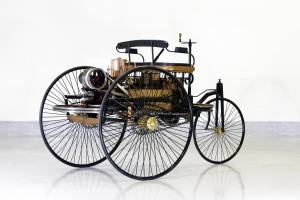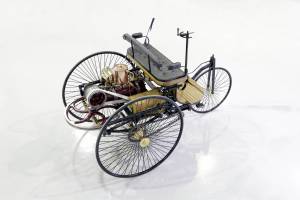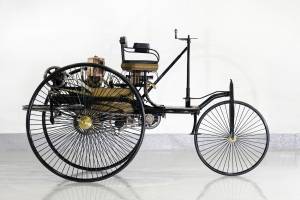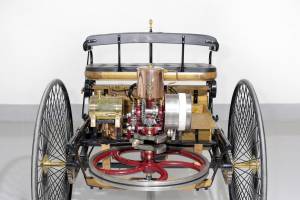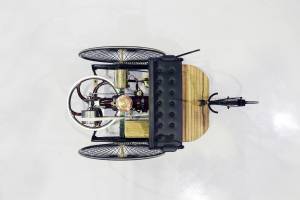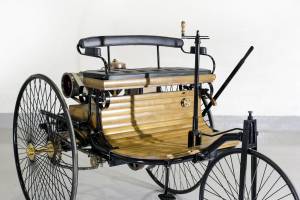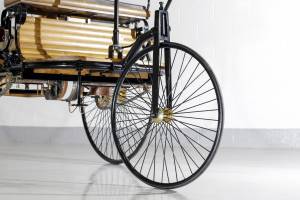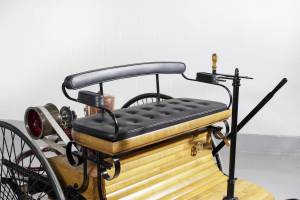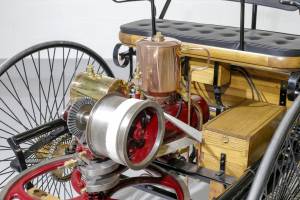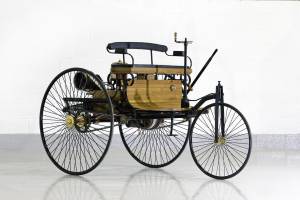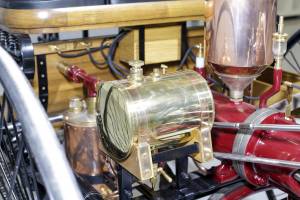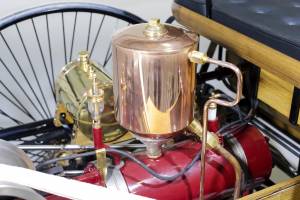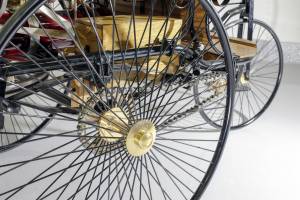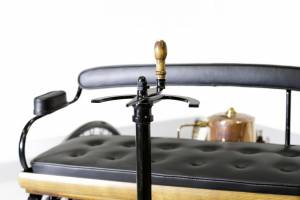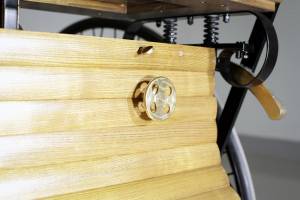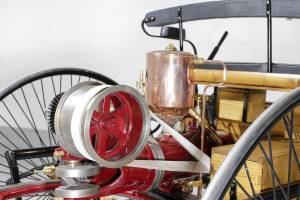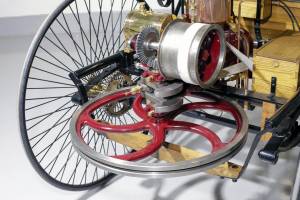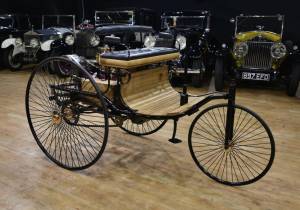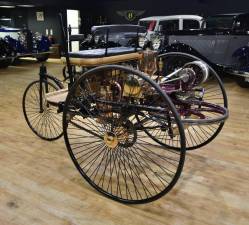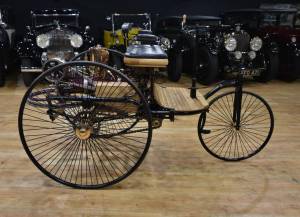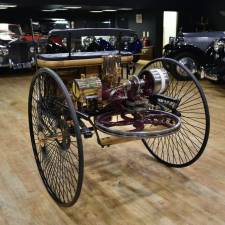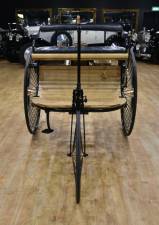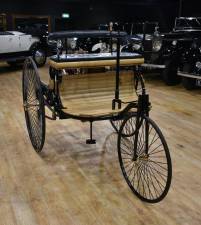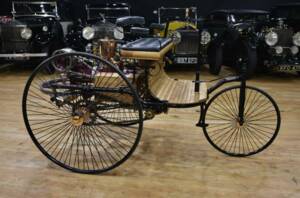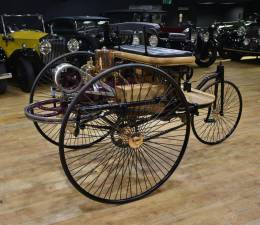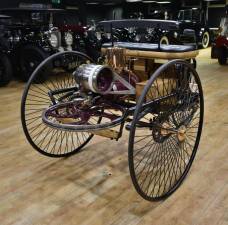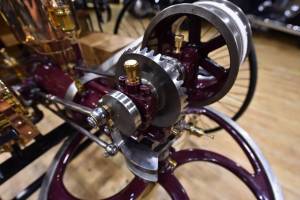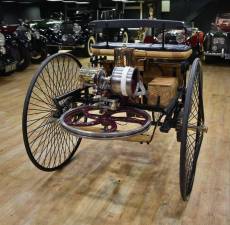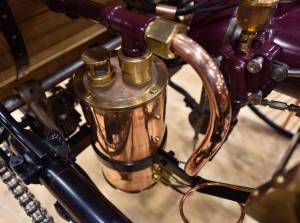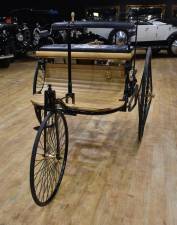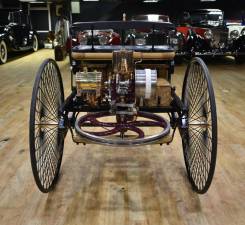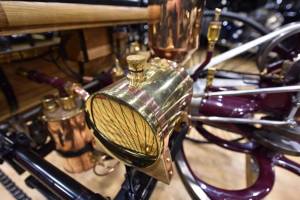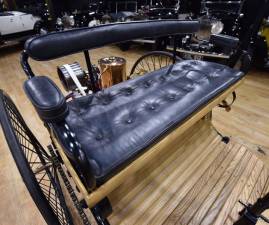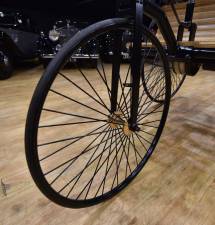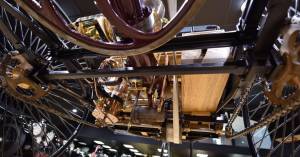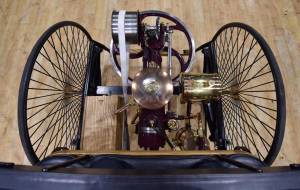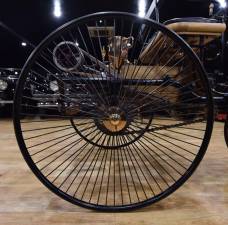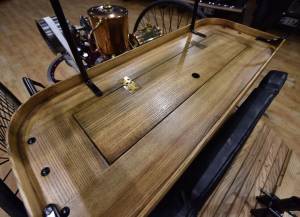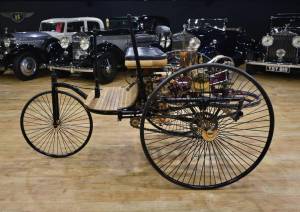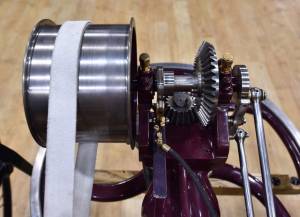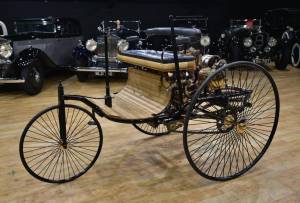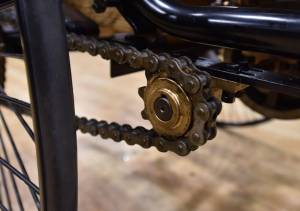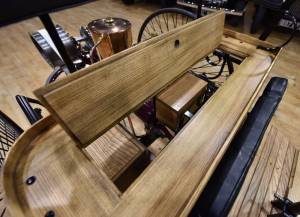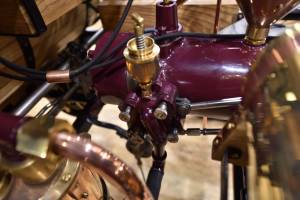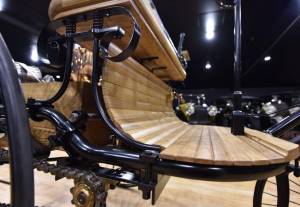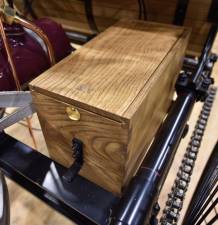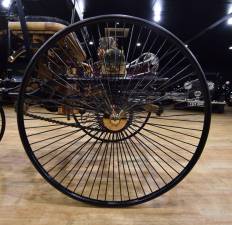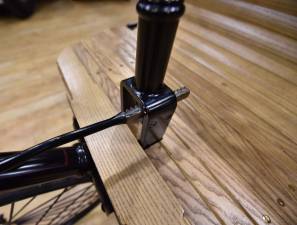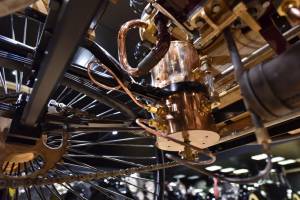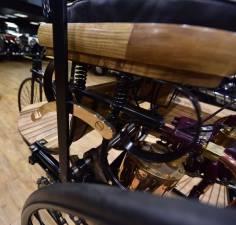1886 | Benz Patent-Motorwagen Nummer 1 Replika
1886 Benz Patent Motor Wagen Replica
1886 Benz Patent Motor Wagen Replica
Alle Services zu diesem Fahrzeug
Beschreibung
View vehicle on YouTube
1886 Benz Patent Motor Wagen Replica.
Chassis number: TBA
Registration number: TBA
Vintage and Prestige Fine Motor Cars are proud to be offering this 1886 Benz Patent-Motorwagen Replica for sale. The Benz Patent-Motorwagen (or motorcar), built in 1886, is widely regarded as the world's first automobile. The original cost of the vehicle in 1885 was $1,000 (equivalent to $26,337 in 2016). This is an exact replica of the original, painstakingly constructed with reference to the original plans.The quality is superb making the Benz easy to drive. It is in brand new condition having just covered some bedding in miles.
The original Benz Patent-Motorwagen was awarded the German patent, number 37435, for which Karl Benz applied on January 29, 1886. Following official procedures, the date of the application became the patent date for the invention once the patent was granted, which occurred in November of that year.
Although Benz's wife, Bertha, financed the development process and would hold patent rights under modern law as a married woman, she was not allowed to apply for the patent.
Benz officially unveiled his invention to the public on July 3, 1886, on the Ringstrasse (Ringstraße) in Mannheim.
About 25 Patent Motorwagens were built between 1886 and 1893.
The Benz Patent-Motorwagen was a three-wheeled automobile with a rear-mounted engine. The vehicle contained many new inventions. It was constructed of steel tubing with woodwork panels. The steel-spoked wheels and solid rubber tires were Benz's own design. Steering was by way of a toothed rack that pivoted the un-sprung front wheel. Fully elliptic springs were used at the back along with a live axle and chain drive on both sides. A simple belt system served as a single-speed transmission, varying torque between an open disc and drive disc.
The first Motorwagen used the Benz 954 cc single-cylinder four-stroke engine
With trembler coil ignition, this new engine produced 2⁄3 horsepower (0.50 kW) at 250rpm in the Patent-Motorwagen, although later tests by the University of Mannheim showed it to be capable of .9 hp (0.67 kW) at 400 rpm. It was an extremely light engine for the time, weighing about 100 kg (220 lb). Although it’s open crankcase and drip oiling system would be alien to a modern mechanic, its use of a pushrod operated poppet valve for exhaust would be quite familiar.
A large horizontal flywheel stabilized the single-cylinder engine's power output. An evaporative carburetor was controlled by a sleeve valve to regulate power and engine speed. The first model of the Benz Motorwagen had not been built with a carburetor, rather a basin of fuel soaked fibers that supplied fuel to the cylinder by evaporation.
Benz later made more models of the Motorwagen, model number 2 boasting 1.5 hp (1.1 kW), and model number 3 with 2 hp (1.5 kW), allowing the vehicle to reach a maximum speed of approximately 10 mph (16 km/h). The chassis was improved in 1887 with the introduction of wooden-spoke wheels, a fuel tank, and a manual leather shoe brake on the rear wheels.
Historic drive of Bertha Benz
The Benz Patent-Motorwagen Nr. 3 of 1888, used by Bertha Benz for the first long distance journey by automobile (more than 96 km or sixty miles)
Bertha Benz, married to Karl, chose to publicise the Patent-Motorwagen in a unique manner. She took the Patent-Motorwagen No.3, supposedly without her husband's knowledge, and drove it on the first long-distance automobile road trip to demonstrate its feasibility as a means to travel long distances. That trip occurred in early August 1888, as the entrepreneurial lady took her sons, Eugene and Richard who were fifteen and fourteen years old, respectively, on a ride from Mannheim through Heidelberg, and Wiesloch (where she took on ligroin as a fuel at the city pharmacy making it the first filling station in history), to her maternal hometown of Pforzheim.
As well as being the driver, Benz acted as mechanic on the drive, cleaning the carburetor with her hat pin and using a garter to insulate a wire. She refueled at the local pharmacy in Wiesloch and as the brakes wore down, Benz asked a local shoemaker to nail leather on the brake blocks, in doing so, inventing brake lining on the way. After sending a telegram to her husband of the arrival in Pforzheim, she spent the night at her mother's house and returned home three days later. The trip covered 194 km (121 mi) in total.
In Germany, a parade of antique automobiles celebrates this historic trip of Bertha Benz every two years. In 2008, the Bertha Benz Memorial Route was officially approved as a route of industrial heritage of mankind, because it follows Bertha Benz's tracks of the world's first long-distance journey by automobile in 1888. Now everybody can follow the 194 km (121 mi) of sign posted route from Mannheim via Heidelberg to Pforzheim (Black Forest) and back.
https://youtu.be/TjZLFJliuR0
Fahrzeugdetails
Fahrzeugdaten
- Marke
- Benz
- Modellreihe
- Patent-Motorwagen
- Modell
- Patent-Motorwagen Nummer 1 Replika
- Erstzulassung
- Nicht angegeben
- Baujahr
- 1886
- Tachostand (abgelesen)
- Fahrgestellnummer
- Registration: TBAPrice: £42,300
- Motornummer
- Nicht angegeben
- Getriebenummer
- Nicht angegeben
- Matching numbers
- Nicht angegeben
- Anzahl Besitzer
- Nicht angegeben
Technische Details
- Karosserieform
- Cabriolet (Dreirad)
- Leistung (kW/PS)
- 1/1
- Hubraum (cm³)
- 954
- Zylinder
- 1
- Anzahl Türen
- 0
- Lenkung
- Rechts
- Getriebe
- Manuell
- Gänge
- Nicht angegeben
- Antrieb
- Heck
- Bremse Front
- Nicht angegeben
- Bremse Heck
- Nicht angegeben
- Kraftstoff
- Benzin
Individuelle Konfiguration
- Außenfarbe
- Schwarz
- Herstellerfarbe
- -
- Innenfarbe
- Schwarz
- Innenmaterial
- Leder
Sonderausstattung
- Rechtslenker
Zustand & Zulassung
- Gutachten vorhanden
- Zustand
- Zustandsbericht beauftragen
- Zugelassen
- Fahrbereit
Anfahrt

Vintage & Prestige Fine Motor Cars
Richard Biddulph
Globe Industrial Estate 9
RM17 6ST Grays
🇬🇧 Vereinigtes Königreich
